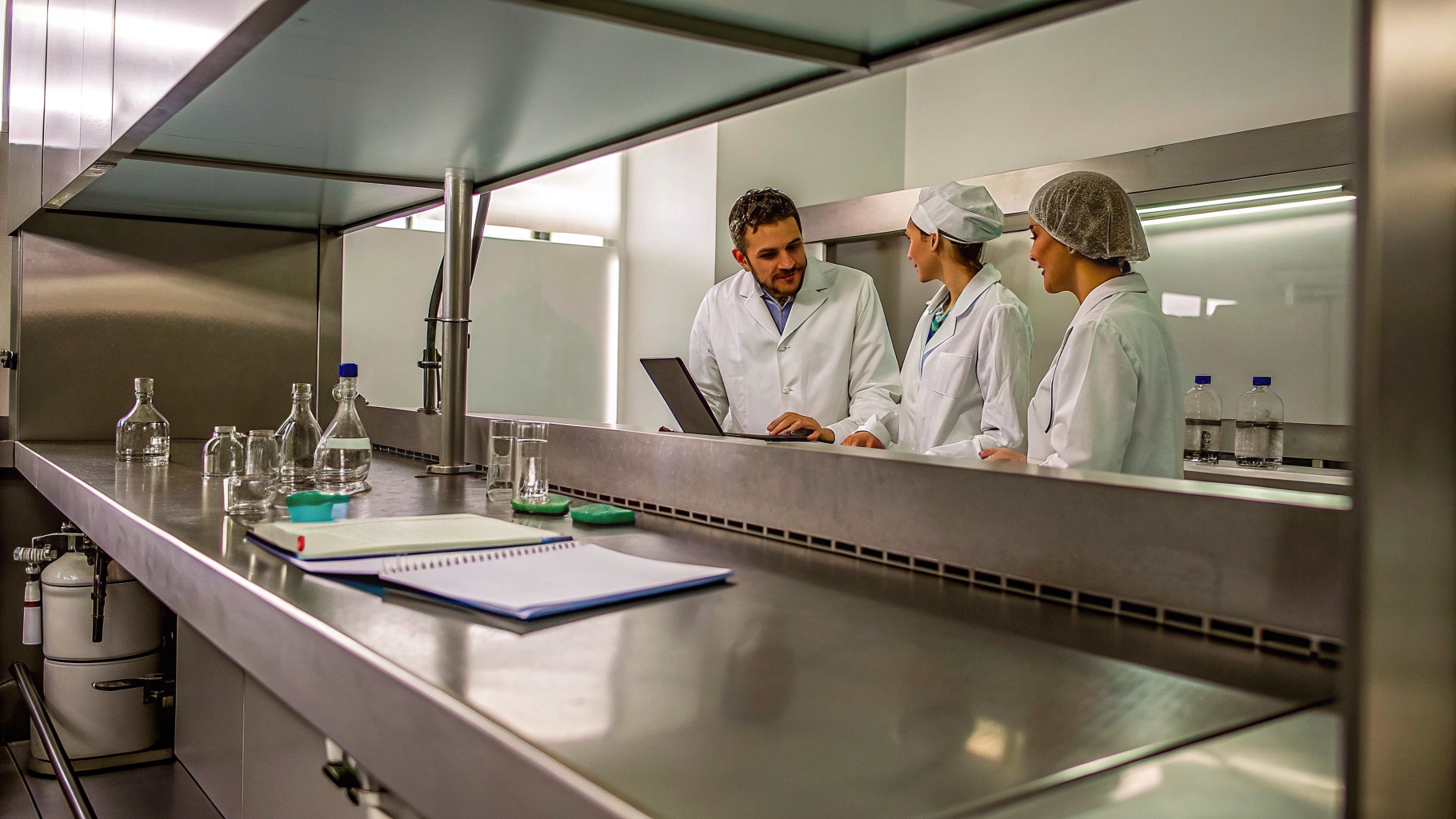Best Practices for Food Technology Consultants in Compliance Management

Overview
Food technology consultants are essential in compliance management, guiding organizations through the complexities of regulatory requirements while implementing best practices that enhance product safety and quality. Organizations face numerous compliance challenges, from navigating stringent regulations to ensuring product integrity. By employing structured strategies and continuous improvement methods, these consultants not only guarantee adherence to standards such as GMP and ISO but also significantly boost operational efficiency. This is evident in the remarkable improvements in compliance metrics observed among organizations that leverage their expertise.
Consider the case of a leading food manufacturer that engaged a food technology consultant to overhaul its compliance processes. Through targeted interventions and a commitment to best practices, the organization saw a 30% reduction in compliance-related incidents within just six months. Such success stories underscore the value of expert guidance in achieving compliance excellence.
In conclusion, engaging with food technology consultants is not just about meeting regulatory standards; it’s about driving a culture of continuous improvement and operational excellence. Organizations looking to enhance their compliance strategies should take action now and explore how AVS Life Sciences can support their journey towards superior product safety and quality.
Introduction
Navigating the labyrinth of regulatory compliance in the food industry presents significant challenges. Yet, food technology consultants are emerging as essential allies in this endeavor. These professionals not only bridge the gap between complex regulations and operational efficiency but also empower organizations to enhance product quality and consumer safety. As the landscape of food technology evolves, businesses must ask: how can they leverage the expertise of these consultants to meet compliance standards while driving continuous improvement and innovation?
By engaging with food technology consultants, organizations can transform compliance from a daunting task into a strategic advantage. These experts provide tailored solutions that not only ensure adherence to regulations but also foster a culture of quality and safety. For instance, successful compliance projects have demonstrated that proactive engagement with consultants leads to improved operational practices and enhanced product offerings.
In conclusion, the collaboration with food technology consultants is not just about meeting compliance requirements; it’s about embracing a pathway to innovation and excellence. Organizations that recognize this opportunity will not only navigate the complexities of regulatory compliance but also position themselves as leaders in the food industry.
Understand the Role of Food Technology Consultants
Food technology consultants play a vital role in assisting organizations in navigating the complexities of regulatory compliance while streamlining operational processes. They assess current practices, pinpoint adherence gaps, and recommend practical improvements. With a deep understanding of safety regulations and quality assurance protocols, food technology consultants guide companies in implementing best practices in manufacturing.
Take AVS Life Sciences, for instance. They offer a comprehensive suite of services, including:
- Validation engineering support
- Quality regulatory strategies
- Training
All aimed at helping clients develop life-changing products while ensuring compliance with Good Manufacturing Practices (GMP) and regulatory standards. A standout achievement is AVS's successful upgrade of a biotechnology client's GMP facility from Biosafety Level 1 to Level 2, completed on time and within budget. This proactive strategy not only reduces the risk of regulatory penalties but also significantly enhances product quality.
Organizations that utilize food technology consultants like AVS Life Sciences have reported a remarkable 26% improvement in frontline adherence to company protocols and procedures. Successful consulting initiatives have shown that structured strategies can yield substantial operational benefits, such as:
- A 30% decrease in backlog for oil and gas refinery work management
- A 35% increase in execution efficiency
With over 300 skilled professionals worldwide, AVS Life Sciences' expertise as food technology consultants is becoming increasingly crucial for maintaining compliance and achieving operational excellence as the food industry continues to evolve. Are you ready to elevate your compliance strategies and operational performance? Engage with AVS Life Sciences today to explore tailored solutions that meet your unique needs.

Identify Key Compliance Standards and Regulations
Food technology consultants must possess a comprehensive understanding of the regulations governing the industry, including Good Manufacturing Practices (GMP), ISO guidelines, and Quality System Regulations (QSR). These standards are not merely bureaucratic hurdles; they are essential for ensuring that products are consistently manufactured and regulated according to established quality criteria. This consistency is vital for maintaining consumer safety and trust.
As we look ahead to 2025, the acceptance of ISO guidelines within the culinary sector is expected to rise significantly. In fact, a remarkable 70% of organizations are anticipated to recognize the importance of these standards in enhancing operational efficiency and compliance. Take ISO 22000, for instance. This standard, which focuses on safety management in the culinary industry, has been successfully implemented by numerous producers, leading to improved marketability and increased consumer confidence.
Regulatory experts assert that adhering to these standards not only fulfills legal obligations but also cultivates a culture of quality and safety within organizations. By leveraging these frameworks, advisors can assist companies in developing robust regulatory strategies that enhance product safety and quality. This proactive approach is crucial for driving success in the competitive culinary landscape.
In conclusion, the integration of GMP and ISO guidelines is not just a compliance necessity; it is a strategic advantage. Organizations will benefit from the expertise of food technology consultants, who guide them in meeting regulatory requirements and positioning them for long-term success in the marketplace. Are you ready to elevate your compliance strategies and ensure your organization thrives?
Establish Effective Communication and Collaboration Practices
Creating efficient communication and teamwork methods is crucial for food technology consultants to effectively manage regulatory compliance. Clear lines of communication between all stakeholders, including food technology consultants, clients, regulatory agencies, and internal teams, are essential. Regular meetings, updates, and feedback loops with food technology consultants ensure alignment on regulatory requirements and project progress.
For instance, food technology consultants might implement a project management tool that facilitates real-time updates and document sharing, thereby fostering transparency and collaboration. Additionally, food technology consultants can organize training sessions to inform staff about regulatory standards, ensuring that everyone understands their role in maintaining compliance. As Monoj Ghosh aptly notes, collaboration with food technology consultants ensures effective and impactful food safety training for all stakeholders involved.
Moreover, firms with effective communication methods are 4.5 times more likely to retain top talent, underscoring the significance of these practices in management. A relevant case study titled 'Collaboration in Food Safety Training' illustrates how effective collaboration with food technology consultants led to improved practices among participants. By addressing common communication challenges and integrating knowledge of nonverbal cues—where 80% of comprehension in dialogue stems from body language—food technology consultants can improve their management strategies.

Implement Continuous Improvement and Compliance Monitoring
Ongoing enhancement and adherence monitoring are essential for food technology consultants aiming to uphold regulatory standards over time. Regular audits and performance evaluations form the backbone of these efforts, pinpointing areas that require improvement. For instance, the implementation of a regulatory dashboard can effectively track key performance indicators related to adherence, allowing organizations to monitor their status in real-time. Statistics reveal that companies with robust adherence programs experience 30% fewer recalls, underscoring the importance of these practices in safeguarding public health and maintaining operational integrity.
Moreover, cultivating a culture of continuous enhancement empowers employees to proactively identify and communicate regulatory issues, leading to quicker resolutions and improved overall quality. By weaving compliance monitoring into daily operations, organizations not only ensure adherence to regulations but also foster innovation and efficiency, positioning themselves as leaders in the technology sector. As industry leaders assert, effective audits and performance evaluations by food technology consultants are vital for building trust and ensuring safety in food production.

Conclusion
Food technology consultants play a crucial role in navigating the complexities of compliance management within the food industry. Their expertise not only aids organizations in meeting regulatory standards but also enhances operational efficiency, ultimately leading to improved product quality and consumer trust. By grasping the multifaceted role of these consultants, businesses can strategically position themselves for long-term success in a competitive marketplace.
Key insights from this article underscore the necessity of adhering to compliance standards such as Good Manufacturing Practices (GMP) and ISO guidelines. These frameworks are vital for ensuring safety and quality in food production. Moreover, effective communication and collaboration among stakeholders are essential for successful compliance management. Implementing continuous improvement practices and compliance monitoring further bolsters an organization’s capacity to maintain high standards and respond proactively to regulatory challenges.
Reflecting on the evolving landscape of food technology, a proactive approach to compliance management is imperative. Engaging with skilled food technology consultants can equip organizations with tailored strategies that not only meet regulatory requirements but also cultivate a culture of quality and safety. It is essential for businesses to adopt these best practices, ensuring they are well-prepared to thrive in the dynamic food industry while safeguarding public health and enhancing their market reputation.
Frequently Asked Questions
What is the role of food technology consultants?
Food technology consultants assist organizations in navigating regulatory compliance and streamlining operational processes. They assess current practices, identify adherence gaps, and recommend improvements.
What specific services do food technology consultants provide?
They provide services such as validation engineering support, quality regulatory strategies, and training to help clients develop compliant products.
How do food technology consultants ensure compliance with regulations?
They guide companies in implementing best practices in manufacturing, ensuring adherence to safety regulations and quality assurance protocols.
Can you provide an example of a successful project by a food technology consultant?
AVS Life Sciences successfully upgraded a biotechnology client's GMP facility from Biosafety Level 1 to Level 2 on time and within budget, enhancing product quality and reducing regulatory risks.
What operational benefits have organizations experienced by using food technology consultants?
Organizations have reported a 26% improvement in frontline adherence to protocols, a 30% decrease in backlog for oil and gas refinery work management, and a 35% increase in execution efficiency.
How many professionals are part of AVS Life Sciences, and why is their expertise important?
AVS Life Sciences has over 300 skilled professionals worldwide, and their expertise is crucial for maintaining compliance and achieving operational excellence in the evolving food industry.
